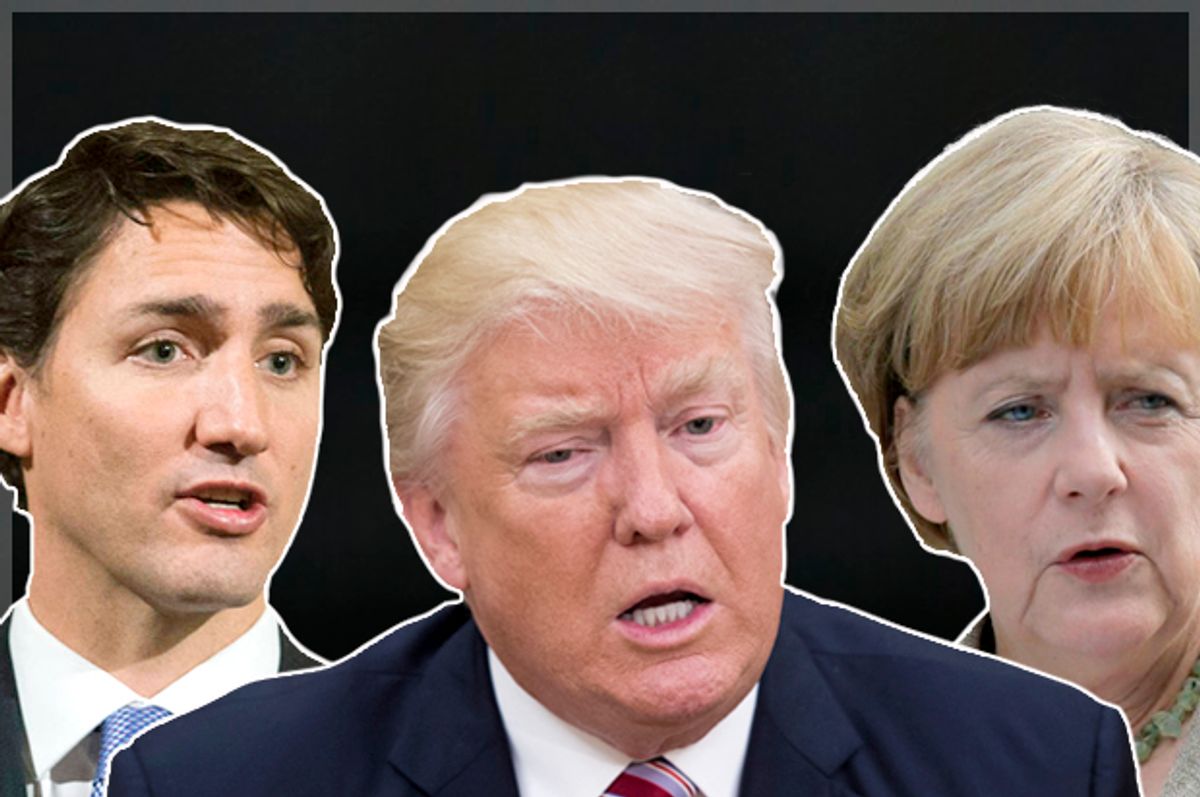After last month’s contentious meeting of G-7 leaders in Taormina, Sicily, German Chancellor Angela Merkel made clear that Donald Trump was isolated on the issue of climate change.
"We made it clear that we want the US to stick to its commitments," Merkel said of the world leaders’ last-ditch pressure campaign for Trump to stay in the Paris climate agreement. At the summit in Sicily, Merkel, newly elected French president Emmanuel Macron and Canadian Prime Minister Justin Trudeau each made personal appeals to Trump.
[salon_video id="14779343"]"The times in which we could completely rely on others are over to a certain extent. That is what I experienced in the last few days," Merkel said last month. "That is why I can only say: We Europeans must really take our fate into our own hands."
But according to a new report from German magazine Der Spiegel, any plans to continue to isolate Trump on the world stage following his ultimate decision “to cancel the Paris climate agreement” quickly fell apart.
"We have to stay together, we have to close ranks," Merkel reportedly told the leaders of the five other biggest western economies in Sicily. The German leader had reportedly crafted a plan to use this summer’s upcoming G-20 meeting in Hamburg to further increase the pressure on Trump.
However, Merkel perhaps should have taken some signal to how difficult the task of isolating the greatest superpower would eventually prove to be from Justin Trudeau's comments to cap the G-7: “I am not going to lecture another country on what it should do.”
Although Trudeau’s criticism of Trump’s decision grew more pointed once he returned to Canada, where he argued that "leaders who think we can hide from these changes, or turn back the clock, are wrong," the plan to isolate Trump had already begun to fall apart by that point.
“Trudeau had apparently changed his approach to Trump and seemed concerned about further provoking his powerful neighbor to the south,” even as Merkel and Macron had continued to privately lobby Trump. According Der Spiegel, Trudeau’s reluctance was shared by the conservative leader of the U.K. and Japan’s Shinzo Abe, the first foreign leader to visit with Trump after his inauguration:
Suddenly, though, Britain and Japan no longer wanted to be part of it. British Prime Minister Theresa May didn't want to damage relations with Trump, since she would need him in the event of a hard Brexit, the Chancellery surmised last week. And given the tensions with North Korea, Japanese Prime Minister Shinzo Abe couldn't put his country's alliance with the U.S. at risk. In other words: Climate policy is great, but when it comes to national interests, it is secondary.
Trump reportedly went on to tell the other leaders that even though staying in the deal was easier, he was going to leave because the agreement was hurting the U.S. economy — an idea he later echoed in the White House Rose Garden, where he said he was picking Pittsburgh over Paris.
“Now China leads,” France’s Emmanuel Macron defiantly told Trump in Sicily, according to the meeting’s minutes.
And although polls show that seven out of ten Americans support staying in the Paris Agreement, according to Der Spiegel, the 19 other members of the G-20 have to still be unable to agree to include even one mention of the climate in the summit’s official closing statement, which all 20 heads of state — including Trump — must sign.

Shares